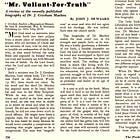Machen was surrounded by academics, politicians, and even church leaders who viewed the church as a means to an ethical, practical, societal end. But the ethics Machen had in mind were radical because they were first oriented vertically (rather exclusively horizontally) and pointed first to another world…not this one.
In the third place, a true Christian Church will be radically ethical. It will not be ethical in the sense that it will cherish any hope in an appeal to the human will; it will not be ethical in the sense that it will regard itself as perfect, even when its members have been redeemed by the grace of God. But it will be ethical in the sense that it will cherish the hope of true goodness in the other world, and that even here and now it will exhibit the beginnings of a new life which is the gift of God.
Machen rightly holds two truths together: all of our good works are as filthy rags (meaning our only “hope of true goodness (is) in the other world” to come), and that sanctification is real—growth in grace does occur.
That new life will express itself in love. Love will overflow, without questions, without calculation, to all men whether they be Christians or not; but it will be far too intense a passion ever to be satisfied with a mere philanthropy. It will offer men simple benefits; it will never pass coldly by on the other side when a man is in bodily need. But it will never be content to satisfy men’s bodily needs; it will never seek to make men content with creature comforts or with the coldness of a vague natural religion….
Some will assume that Machen died with the segregationist (if not racist) attitudes he had expressed privately 22 years earlier. If we take him at his word here near the end of his life we might believe that even Machen could experience the type of sanctification he knew the Bible taught:
Rather will it seek to bring all men everywhere, without exception, high and low, rich and poor, learned and ignorant, compatriot and alien, into the full warmth and joy of the household of faith.
One of the responsibilities of the church in every new age is to call her members to holy living now—whenever “now” is.
Read The Responsibility of the Church in Our New Age in full.
Listen to a fine reading of the article (39 minutes) by Bob Tarullo.
Stay tuned for future/final installments - by Brad Isbell
READ PART 11:




